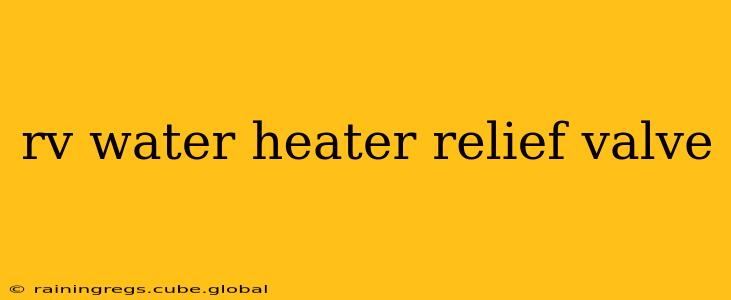Your RV's water heater is a crucial component for comfortable camping, providing hot water for showers, dishes, and more. A key safety feature of this system is the temperature and pressure relief valve (T&P valve). Understanding its function, maintenance, and potential problems is vital for ensuring both safety and the longevity of your RV's water heater.
What is an RV Water Heater Relief Valve?
The RV water heater relief valve, often called a T&P valve (Temperature and Pressure Relief Valve), is a safety device designed to automatically release excess pressure and temperature buildup within the water heater tank. This prevents potentially dangerous situations like explosions or scalding. If the water inside gets too hot or the pressure rises too high—due to overheating, a faulty thermostat, or other malfunctions—the valve opens, releasing hot water and reducing pressure. This safety mechanism is absolutely critical for preventing serious accidents.
How Does an RV Water Heater Relief Valve Work?
The valve utilizes a spring-loaded mechanism and a thermal element. When the water temperature exceeds a predetermined threshold (typically around 210°F or 99°C), the thermal element activates, opening the valve. Similarly, if pressure surpasses a safe limit (usually around 150 PSI), the spring-loaded mechanism will also open the valve. The hot water is then released through a discharge pipe, typically exiting outside the RV.
Why is Testing My RV Water Heater Relief Valve Important?
Regular testing ensures the valve is functioning correctly and will activate when needed. A malfunctioning valve can lead to serious safety risks. Testing is a simple process and should be a part of your routine RV maintenance.
How Often Should I Test My RV Water Heater Relief Valve?
It's recommended to test your RV water heater relief valve at least once a year, or even more frequently if you use your RV extensively. This preventative measure helps ensure the safety and longevity of your water heater.
How Do I Test My RV Water Heater Relief Valve?
Testing is straightforward: Simply lift the small lever on the valve. If the valve is working properly, a small amount of hot water should be released. If no water is released, the valve might be faulty and needs replacing. Caution: Be prepared for hot water and position yourself to avoid burns. Always let the water heater cool down before testing.
What Happens if My RV Water Heater Relief Valve Leaks?
A leaking T&P valve might indicate a problem. A slight drip after testing is normal, but continuous leaking requires immediate attention. It could be due to a faulty valve, excessive pressure within the system, or a problem with the water heater itself. In such cases, professional assessment is recommended.
How Do I Replace My RV Water Heater Relief Valve?
Replacing the valve is usually a relatively simple process, but specific steps vary depending on the water heater model. Consult your water heater's manual for detailed instructions. If you're uncomfortable performing the replacement yourself, it's best to seek professional help. Remember to always turn off the water supply and allow the water heater to cool down completely before attempting any repairs or replacements.
What Causes Excessive Pressure in My RV Water Heater?
Excessive pressure can stem from several sources: a faulty pressure relief valve, a malfunctioning thermostat (causing overheating), a problem with the water pump, or a blockage in the water lines. Addressing the root cause is crucial for preventing future issues.
Can I Use My RV Water Heater Without the Relief Valve?
Absolutely not. Operating an RV water heater without a functional relief valve is incredibly dangerous and poses a significant risk of serious injury or property damage. The relief valve is a crucial safety device that must always be in place and functioning correctly.
This comprehensive guide provides essential information about your RV's water heater relief valve. Remember, regular maintenance and prompt attention to any issues are crucial for ensuring your safety and the longevity of your RV's water heating system. If you're unsure about any aspect of testing or maintenance, consult a qualified RV technician.
